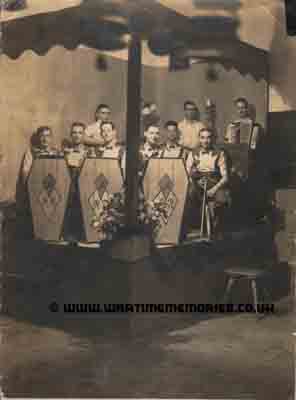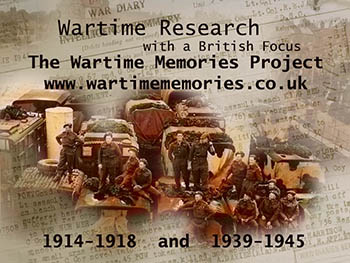|
|
|
1st Regiment, Royal Horse Artillery
1st Regiment Royal Horse Artillery was formed on the 1st of May 1938 by the renaming of 1st Brigade Royal Horse Artillery. They went to France in 1940, B/O Battery served with 51st (Highland) Infantry Division and saw action at St Valery where the survivors were captured. Survivors of A/E Battery made it back to Britain after the Battle of Dunkirk and the regiment reformed in Wales. They saw action in the North African Desert Campaign from October 1940. In February 1942 O Battery left it to join 6th RHA, and 1st RHA was re-organised as A, B and E batteries. They were in action as part of 7th Armoured Division at Gazala, during the Siege of Tobruk and with 10th Armoured Division at El Alamein. The Regiment was then withdrawn to refit then served in in Syria, Palestine and the Suez Canal Zone. In May 1944 they landed at Taranto in Italy from Palestine saw action during the Italian Campaign until the end of war.
23rd of November 1939 Orders
19th Apr 1940 On the Move
1st May 1940 Reliefs
13th May 1940 In Action 
15th May 1940 Orders
20th May 1940 Withdrawal
22nd May 1940 Threat
23rd May 1940 In Reserve
24th May 1940 Orders
25th May 1940 On the Move
26th May 1940 Moves
27th May 1940 On the Move
28th May 1940 On the Move
9th Jun 1940 In Defence
10th Jun 1940 On the March
11th Jun 1940 Surrounded
11th Jun 1940 Furious Fighting
11th Jun 1940 Orders
11th Jun 1940 Enemy Advance
12th Jun 1940 Situation Hopeless
11th Dec 1940 In Action 
14th Dec 1940 Enemy Sighted 
1st Apr 1941 On the Move
2nd Apr 1941 In Action
If you can provide any additional information, especially on actions and locations at specific dates, please add it here.
|
|
|
The Wartime Memories Project is the original WW1 and WW2 commemoration website.
Announcements

- 1st of September 2024 marks 25 years since the launch of the Wartime Memories Project. Thanks to everyone who has supported us over this time.
- The Wartime Memories Project has been running for 25 years. If you would like to support us, a donation, no matter how small, would be much appreciated, annually we need to raise enough funds to pay for our web hosting and admin or this site will vanish from the web.
- 18th Dec 2024 - Please note we currently have a huge backlog of submitted material, our volunteers are working through this as quickly as possible and all names, stories and photos will be added to the site. If you have already submitted a story to the site and your UID reference number is higher than
265120 your information is still in the queue, please do not resubmit, we are working through them as quickly as possible.
- Looking for help with Family History Research?
Please read our Family History FAQs
- The free to access section of The Wartime Memories Project website is run by volunteers and funded by donations from our visitors. If the information here has been helpful or you have enjoyed reaching the stories please conside making a donation, no matter how small, would be much appreciated, annually we need to raise enough funds to pay for our web hosting or this site will vanish from the web.
If you enjoy this site
please consider making a donation.
Want to find out more about your relative's service? Want to know what life was like during the War? Our
Library contains an ever growing number diary entries, personal letters and other documents, most transcribed into plain text. |
|
Wanted: Digital copies of Group photographs, Scrapbooks, Autograph books, photo albums, newspaper clippings, letters, postcards and ephemera relating to WW2. We would like to obtain digital copies of any documents or photographs relating to WW2 you may have at home. If you have any unwanted
photographs, documents or items from the First or Second World War, please do not destroy them.
The Wartime Memories Project will give them a good home and ensure that they are used for educational purposes. Please get in touch for the postal address, do not sent them to our PO Box as packages are not accepted.
World War 1 One ww1 wwII second 1939 1945 battalion
Did you know? We also have a section on The Great War. and a
Timecapsule to preserve stories from other conflicts for future generations.
|
|
Want to know more about 1st Regiment, Royal Horse Artillery ? There are:456 items tagged 1st Regiment, Royal Horse Artillery available in our Library There are:456 items tagged 1st Regiment, Royal Horse Artillery available in our Library 
These include information on officers, regimental histories, letters, diary entries, personal accounts and information about actions during the Second World War. |
|
Gnr. Robert Leslie "Topper" Brown 1st Regiment Royal Horse Artillery Robert Brown served with 1st Regiment, Royal Horse Artillery during WW2.
|
Gnr. Frank William Jennings 1st Regiment Royal Horse Artillery Frank Jennings joined the British Army before the outbreak of WW2. He served with the Royal Horse Artillery, I believe, in the 1st Regiment.
He was posted to France and evacuated at the Battle of Dunkirk. He was then posted to the Middle East and was blown up whilst operating a 25 pounder field gun at the battle of Sidi Rezegh, I believe.
He survived although sustaining wounds that meant he was repatriated and demobbed. He loved the Army although he spoke very litle of his experiences, I believe they scarred him physically and mentally. He was my dad.
|
Gnr. Arthur William Seymour 1st Regiment Royal Horse Artillery (d.5th Dec 1941) Arthur Seymour was born in Biggleswade in 1918. Husband of Dorothy M Seymour (nee Woodhouse)of Jarrow. He died aged 23.
Arthur is remembered on the Alemein Memorial and is commemorated on the WW2 Roll of Honour Plaque in the entrance of Jarrow Town Hall.
|
Gnr. George Wilfred Wyatt 1st Regiment Royal Horse Artillery  This is the writing of George Wilfred Wyatt, written in the mid 90's about his experience
"Courage and Determination"
In 1939 after working down the mines for four years, I joined the army and served as a gunner in the Royal Horse Artillery. I was posted to France as part of the 51st Highland Division B.E.F. and was taken Prisoner of War at St. Valery in June 1940.
We marched to Holland and then went onto Emerich in Germany by barge. We then travelled by train to Scubin in Poland where we were put into working party camps. Whilst at this camp we were sent to work on farms, in factories and on the railways and roadworks. We were also sent to build camps for P.O.W's.
About two years later in 1942, we were sent to work in the mines in the Katowice mining area. At this mine, a young Polish girl was working in the lamp cabin. Her job was to hand out checks and lamps to the miners working below ground. This was the beginning of my friendship with this young Polish girl named Halinka. As our relationship blossomed daily to eventually corresponding and meeting occasionally whenever possible during the following years. Halinka's father was a Polish Resistance leader who lived throughout the war never knowing whether that dreaded knock at the door would ever come, (i.e. "Gestapo"). Halinka obviously kept her friendship with me a big secret, knowing that any relationship with a P.O.W. would be against her father's wishes.
During the last few months of 1944, we moved to another mine, 20 kilometres north of Halinka's village and later still yet another mine, 15 kilometres south of her village. However, every few days I would see Halinka walking near by the camp. Sometimes, we could have a chat and other times it would be impossible, but she never complained.
In January 1945 along with a friend, we escaped from the camp and made our way with the help of Polish friends to the village some 15 kilometres away. Knowing the Russians were advancing to the area, local people hid us until we were liberated. We then decided to get married. So we travelled to Krakow airport where the R.A.F. had a base travelling on top of a cattle truck 80 kilometres to receive permission from an officer, which he granted and signed my pay book, escorting me out of the base, against the will of the Russians. We made our way to the city of Krakow 5 kilometres away and found a church with a friendly priest who willingly agreed to marry us and also kindly found us accommodation for our wedding night. We returned to my wife's home in Niwka and after the initial shock, her family accepted us with open arms and gave us their blessing although with a little doubt. (Was I true or false).
Our happiness did not last long, as the Russians put out an order that all P.O.W's must report to military headquarters within a week or be treated as spies and shot. A party of eight reported to Krakow where we were given hard rations, mostly dried vegetables, for 4 days journey by train to Odessa. They would not allow girls to travel, however, between us we managed to smuggle my wife Halinka with us, hiding her under top coats in our sleeping compartments. On arrival at Odessa, the British Military Mission, who had to escort her back home, held my wife. I was sent home by merchant ship, via Italy, Gibraltar and Scotland. On my arrival, I informed my unit and the British Red Cross of my marriage and received only acknowledgement. Later my wife came home from Odessa with a British Military escort and was told to wait until later and to get in touch with the British Embassy, which at this time did not exist. However, Halinka being very impatient decided to make her own way to Prague in Czechoslovakia with papers or passport. At the British Embassy, her good luck still held out. After being checked, she finished up in the office of a Major Wyatt whom was delighted at meeting a namesake and looked after her the time she spent in Prague. Halinka arrived in London on VJ Day, unable to contact anyone owing to a public holiday. However, the police found me and informed me that Halinka was on her way to Nottingham by train and that I should meet her when she arrives. Courage and determination played a big part in our romance throughout.
George Wilfred Wyatt
I hope that I have done the right thing for my uncle Wilf. He was a kind man and did tell me one or two anecdotes about life in the camp. If I remember rightly, he told me how they used to make fish soup by tying the fish onto a piece of string and passing it across the top of the boiling water. They didn't eat very much as the rations the Germans gave them were very meagre indeed. I suspect probably just enough to keep them going. He also told me of the time when he was out with some of his POW mates. I think he worked nearby in a mine or a farm. They had been given some eggs and they were looking forward to having something more substantial to put into their stomachs. One of the guards stopped them and when he went to search the knapsack, uncle Wilf gave the bag a huge clap and smashed all the eggs, so then the Germans couldn't take the eggs either. He had a very dry sense of humour and was a genuine good man.
|
Recomended Reading.Available at discounted prices.
|
|
|








